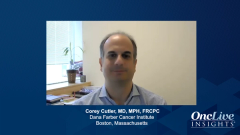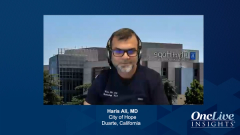
Chronic GVHD: Real-World Use of Ruxolitinib
Closing out his summation of ruxolitinib in chronic GVHD, Yi-Bin Chen, MD, considers how real-world use compares with the REACH3 trial results.
Episodes in this series

Transcript:
Yi-Bin Chen, MD: I’ll be honest: the publication of REACH3 hasn’t significantly influenced our practice. We were already using ruxolitinib as our standard second-line therapy for chronic graft-vs-host disease because of the literature out there and our experience. Since approval, it has given more patients access—for the small number of patients who we could not get it for before—and it’s validated our practice that it should be the second-line therapy.
In terms of specific populations with steroid-refractory, steroid-dependent chronic graft-vs-host disease, there are very few that I would not give ruxolitinib to. I haven’t had huge issues with toxicities and having to stop therapy with ruxolitinib because of those. We do run into cytopenias, which are a well-known adverse effect of ruxolitinib. It’s thought to be through the JAK2 signaling cascade, and there’s a certain amount of anemia and thrombocytopenia. This was borne out in the REACH3 trial. But with our dose adjustments, or even dose holds, we can usually get around those cytopenias.
There’s a small subset of patients for whom we stop the drug because the thrombocytopenia or the anemia is too severe. If patients are starting at very low levels for whatever reason, those might be the only patients who are not candidates to use ruxolitinib. But for everyone else who needs another agent beyond steroids, I’d have no hesitation about using ruxolitinib.
We haven’t seen an excess of infections. That’s the other worry when using an agent for graft-vs-host disease that might be an anti-inflammatory or immunosuppressive. REACH3 had a slight, probably nonsignificant, incidence of infections over the control, and our experience has been just that. We keep patients on prophylaxis for varicella and HSV [herpes simplex virus], and we have monitoring for other infectious agents, but if they’re able to get off steroids, that’s a huge advantage for these patients because their immune system is better.
Transcript edited for clarity.









































